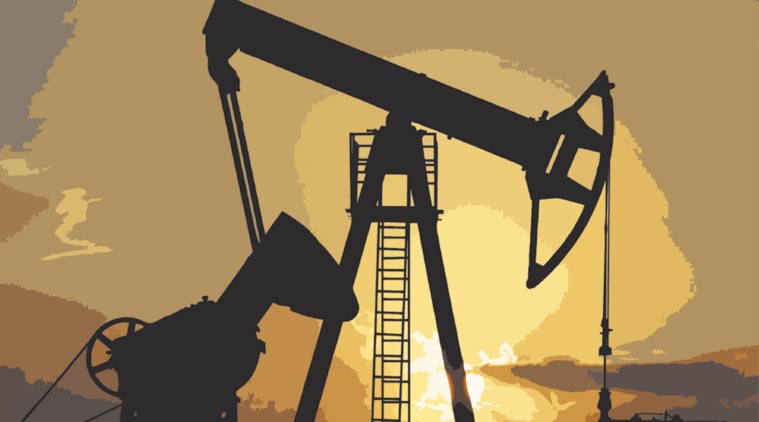- India
- International
Oil in a post-Covid world
Behaviours will shift, uncertainties will deepen. India should build strategic reserves, use alternatives like natural gas and increase efficiency of its oil companies.
 Brent crude futures dropped 15 cents, or 0.23 per cent, to $64.12 a barrel by 0421 GMT, while West Texas Intermediate (WTI) crude futures fell 16 cents, or 0.27 per cent, to $58.25 per barrel. (Representational image)
Brent crude futures dropped 15 cents, or 0.23 per cent, to $64.12 a barrel by 0421 GMT, while West Texas Intermediate (WTI) crude futures fell 16 cents, or 0.27 per cent, to $58.25 per barrel. (Representational image)
Things fall apart; the Centre cannot hold/Mere anarchy is loosed upon the world — W B Yeats
In the midst of a global pandemic of epic dimensions, one is hesitant to write about the narrow subject of petroleum. It seems so trivial. But then, if there is one certainty, it is that human ingenuity and technology will push us, sooner (hopefully) than later, into a post-COVID world. And at that time, India will, once again, confront the challenge of oil and gas supply security. We should, therefore, ask: What will be the landscape of the petroleum sector, post-COVID? And what should India do now to prepare for an uncertain and contingent energy future?
The centre has indeed “fallen apart” in the international petroleum market. The concept of MAD (Mutually Assured Destruction) deterred the nuclear powers during the Cold War. It has had no such effect on the oil powers. For, at a time when the virus had pushed the global economy into recession, the proxies of the Crown Prince of Saudi Arabia, Mohammed Bin Salman (MBS) and the Russian President, Vladimir Putin, took a set of decisions last month that knocked the economic props from under the oil market. The Saudis decided to flood the market to hold onto market share and the Russians accepted the consequent decline in prices to push the US shale industry to the wall. Both may achieve their objectives but they have sounded the death knell of OPEC and possibly that of the oil industry as well.
In the late 1990s, The Economist did a story on oil prices. The cover page had a picture of an oil barrel with an arrow painted in red slicing downwards across the barrel with “$5?” written in bold on the side. I am reminded of this article because it is reflective of current conditions. Today, the price of oil, at just above $30/bbl (at the time of writing), is at its lowest in a decade, and volatile downwards. The average price in 2019 was $64/bbl. The reason is two-fold. One, the Saudis have ramped up production from 9.8mbd (before the March meeting) to in excess of 12 mbd today. And two, there has been an unprecedented COVID-induced crash in demand. This is because of the lockdown of the two main drivers of oil consumption — transportation and industry. It is estimated that oil consumption in the current quarter will fall by approximately 25 mbd. This is almost as much as OPEC’s production. The Saudis and Russia may still come to an understanding that rallies the price but it would not surprise me if The Economist wrote another cover story with a similar picture, except with “$20?” instead of “$5?” written next to the arrow.
Three verities now hang over the petroleum market.
One, every major oil-exporting country will face a budgetary crisis. Qatar has the most robust balance sheet of all OPEC members. But it still needs an oil price of around $40/bbl to balance its books. Algeria has the weakest. It needs an excess of $100/bbl. Saudi Arabia is at the Algerian end of the spectrum requiring a price of around $80/bbl. This does not mean these countries are about to go financially belly up. Most of them, the Gulf producers, in particular, have abundant sovereign reserves. But what it does mean is they will be hard-pressed to sustain their social and economic commitments. They will have to cut back on subsidies, raise taxes and the citizens will be required to tighten their belts. This will not be well-received and India should build into its oil supply plans the likelihood of civil strife in these countries.

Two, the international oil industry will be reconfigured. Already, at current prices, a large number of companies are finding it difficult to cover their cash costs and have been forced to cut production and shutter operations. At even lower prices, they will become bankrupt. Whatever the final outcome, one fact is clear. Those that survive the carnage will have substantially slimmed balance sheets and reduced valuations. Exxon’s market capitalisation has, for instance, halved over the past month. Against this backdrop, we should drop the expectation of international interest in BPCL. Or for that matter ME investment into India. The $40-billion Ratnagiri refinery project by Saudi Aramco and UAE will certainly not see the light of day. We should also expect a drop in the intensity of domestic exploration.
Three, the world, post-COVID will be different from the world pre-COVID. Behaviours will shift and these will deepen uncertainties. “Social distancing” may change the dynamics of “shared mobility”. Teleporting may reduce business travel. Heightened awareness of the porosity of national boundaries may accelerate the push towards decarbonisation? These uncertainties will push the petroleum market deeper into no man’s land.
India cannot escape its own domestic verity. Whatever be the shape of the post- COVID international petroleum market, India will be dependent on it to secure its domestic energy requirement. The question should, therefore, be asked. What should the decision-makers do today to respond to such a contingent and uncertain future?
I have the following four suggestions.
One, it should fill the oil caverns with strategic reserves. Prices may fall further but rather than bottom fish, it should leverage the availability of capacity to secure discounted supplies. The world has run out of storage capacity and producers may pay premium dollar to find space for their unsold cargoes.
Second, it should increase its imports of gas (LNG ) from Australia, Africa and the US. This will reduce the political risks of dependency on oil supplies from the Middle East. Gas is also now economically competitive. The landed price of LNG is low enough to kick-start some of the stranded gas-based power plants.
Third, it should unthread the “patchwork quilt of authority” exercised by bureaucrats, regulators and politicians, which today stifles management and operational efficiency of the petroleum companies.
And finally, it should create an institutional basis for an integrated energy policy. If there is one message we must internalise from COVID, it is the importance of collaboration and coordination.
The writer is chairman and senior fellow, Brookings India
EXPRESS OPINION
Apr 25: Latest News
- 01
- 02
- 03
- 04
- 05










































